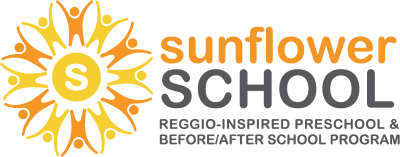At Sunflower, our goal is to offer a safe, calm and happy environment where children can grow intellectually, emotionally, physically and socially. In our practice we are strongly influenced by the Reggio Emilia approach to early learning. Loris Mallaguzzi and the families of Reggio Emilia in Italy, started the Reggio Emilia approach after the Second World War. The parents in this community felt that children form who they are as individuals in their early years of development, which led to the creation of a program based on principles of respect, responsibility and community through exploration and discovery, in a supportive and enriching environment, made rich through the interests of the children. Reggio Emilia is an approach to learning and education, and as part of this we believe that children learn in a multitude of ways. To support children in their many ways of exploring the world, her are some examples of opportunities for learning that we offer:
- Local walks and field trips
- Music classes with a specialized teacher
- Movement classes; as of September 2019 with a teacher from Driftwood Dance
- Yoga with our certified Kids Yoga teacher
- Gardening with an experienced horticulturalist.
Routines
As for all young children, routine is certainly an important part of life, and we respect that all children come from different backgrounds with different types of routines.
The democratization of our curriculum is based on respect for children’s rights, which includes loosening and removing any barriers to learning related to daily routine and hidden curriculum, giving children the possibility to choose among a variety of opportunities and resources. An important part of a democratic education, involves opportunities to listen to others ideas and opinions that may be different to our own, therefore we encourage a circle time each day where children and adults engage in discussion and reflection.
Our routine consists of periods of active learning, which are; planning; implementation; restoration; working in small and large groups; outdoor play and exploration; transitional activities. Our belief is that our routine should be designed so that it strengthens and promotes a child’s abilities, natural interests, self-initiative, and problem solving skills.
In addition, our daily routine also facilitates the passage of the children from home to Preschool, and vice versa, because it builds a sense of community.
Drop off and pick up times are set, unless arranged with a teacher in advance. This is to ensure safe drop off and pick up of all children, every day. At drop off times, we will usually have a sign in the doorway letting families know where we will be starting that day, often in the garden, but sometimes in the gym or classroom. We ask that parents drop their child off directly with the teachers so we know who has arrived and at what time, and can exchange any important information with one another. At picking up time, we invite parents to wait outside our classroom in the hallway, so teachers can safely release one child at a time to their guardian. Again, sometimes we may be outside playing, or in the gym, and still ask that parents engage with a teacher when arriving, and before leaving.
Snack time is often a favorite time of the day for children! We usually collect our snack after coming in from the garden and relax for a while. Children each bring their own pack lunch and drink of water, and enjoy talking about what they have brought along with them and chatting with their friends around our big snack table. We trust that children are getting to know their bodies, including when they are thirsty, hungry or full, and offer them the language to communicate these feelings and work out what it is that they need. As it is a short session, eating snack is not mandatory. If a child is not hungry we will often gently encourage them to think about if their body feels hungry before letting them continue with their activity and allowing them to eat later on if they want to, snack boxes are placed in baskets in the classroom at the child’s level, so are accessible to them at all times. Although this is something that is different for every child and will be discussed with parents on an individual basis if it is a matter of concern.
Teaching
At Sunflower there are 2-3 qualified teachers in each class, which is above the recommended licensing ratio for our groups. We know it is important not only for the children to be supported and engaged with consistently, it’s also important for our teachers to be supported and inspired. Even though our teachers are already qualified as ECE’s and ECEA’s, we never stop learning from each other every day, and offer opportunities for professional development throughout the year, to make sure we’re always giving the children our best.
We welcome families to be a part of the Sunflower community and encourage family members to join us as a volunteer in the classroom at least once throughout the year. It’s a great way to share in your child’s preschool experience.
